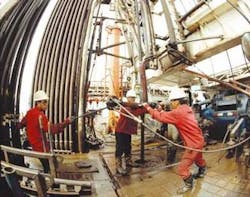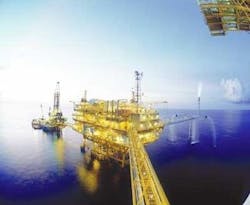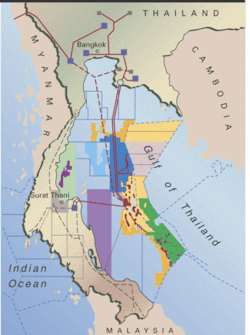Thailand to see continued development
Judy Maksoud
International Editor
Unocal to invest $4 billion in the next seven years
Unocal and its co-concessionaires expect to spend $4 billion in the Gulf of Thailand over the next seven years. The company will spend $577 million next year alone to pursue petroleum development activities.
This sizable budget supports ongoing development that will nearly double oil output from the offshore fields to 40,000 b/d by 3Q 2005, but the bulk of the capital will continue to go toward Unocal's extensive natural gas production, which is being developed to meet increased market demand.
The company has set a target to produce a contracted volume of 1.6 bcf/d as early as 2010 to meet the growing Thai market and to supply gas to the third gas pipeline that the Petroleum Authority of Thailand (PTT) will start up in 2006.
null
Domestic gas demand
The growing domestic demand for gas is the stimulus for much of Unocal's activity off Thailand. According to Neil Smith, Unocal Thailand's vice president of exploration, the share of natural gas in Thailand's power generation has increased by 25% from 1995 to 2003 and accounts for 68% today. "The demand is expected to grow 5-6% through 2015," Smith says.
Unocal is now in discussions with Thai agencies to increase gas production over current contracted volumes when PTT's third pipeline is installed in two years. "Once agreements are reached on timing and volumes, Unocal plans to execute an accelerated delineation drilling program of 30 to 45 wells over the period 2005 to 2007," Smith says.
Domestic demand is driving E&P. Last year Unocal signed a heads of agreement with PTT to increase natural gas sales beginning in 2006.
"The agreements essentially call for Unocal to raise contracted gas deliveries from Erawan, Thailand's first offshore gas concession area, and the Unocal 2/3 operating areas to PTT. The increase will be made over the next 10 years or so to 1.6 bcf/d to support the growing energy demand of the country," Smith says.
The company will have to drill as many as 230-240 development wells a year, up from the previous average of 100-130 wells a year. To reach that goal, Unocal is searching for additional gas reserves and improving recovery from its existing operating areas. Smith says Unocal will continue to look for new exploration and production opportunities in Thailand through acquisitions and bidding for new licenses.
Over the past decade, Unocal's exploration efforts have contributed to a substantial increase in Thailand's total resource potential – from 6 tcf to more than 14 tcf.
According to David Holligan, vice president of operations for Unocal Thailand, "A key benchmark of a successful exploration and production company is its ability to replace the gas that it produces yearly. During the past five years, Unocal Thailand has achieved an average yearly replacement rate of 150%, reflecting continued success in its exploration and development activities."
However, as producing areas mature, reserves for individual well targets get progressively smaller. Additional innovation and low-cost approaches will be needed to recover all of the reserves, Holligan says.
Some of the new approaches will incorporate new technologies, something Unocal Thailand has actively applied in its search to cut costs and increase production. "Our organization culture has continued to push for innovation," Smith says.
Historically, Unocal Thailand has averaged about 100 wells per year, but in recent years the pace of drilling has accelerated dramatically, Smith says. New technology is one of the key reasons.
"Innovative slim-hole technologies have made drilling faster and more efficient than ever," Smith explains. "In the early 1980s, a typical gas well about 11,000 ft deep cost the company over $5 million and took 68 days to drill. Today, Unocal spends about $800,000 to drill the same well in less than six days."
Gas production
Unocal Thailand operates 16 gas and condensate operating areas for its co-concessionaires, Mitsui Oil Exploration Co. Ltd., PTT Exploration and Production Public Co. Ltd. (PTTEP), Amerada Hess (Thailand) Ltd., and Moeco Thai Oil Development Co. Ltd. These include eight blocks in the Gulf of Thailand covering 11,838 sq km.
Unocal is also a minority partner in three blocks in the 4,000-sq-km Arthit project, where PTTEP is the operator. Plans are in place for Arthit to be producing a contracted volume of 330 MMcf/d of gas in late 2006 or early 2007.
The Arthit field will be a major new source of dependable, low-cost domestic gas supplies for the Thai market. Unocal has a 16% interest in this field, which PTTEP discovered in 1999. Arthit, which is 250 km offshore, is a world-class gas field with estimated reserves of 2-4 tcf.
The seven wells drilled on the Arthit field between 1999 and 2000 were a highlight for Thailand's petroleum exploration business and expanded the area of a working petroleum system. The second drilling campaign took place between 2001 and 2002. PTTEP drilled 14 exploratory/appraisal wells proving the field's commerciality. In 2004, PTTEP drilled eight exploration and appraisal wells in blocks B14A and B15A. The company will also drill about 80 production wells in 2005 and 2006 in preparation for start-up. Initial gas production is projected for late 2006 or early 2007.
In addition, Unocal Thailand recently completed a successful three-well delineation drilling program in the South Gomin operating area, comprising approximately 319 sq km in block 13. First production from South Gomin is expected in late 2006.
Oil development
Oil is a recent addition to Unocal Thailand's offshore operations. As part of gas exploration efforts off Thailand, the company discovered several offshore oil deposits.
"Based on the small resource accumulation, the areas were initially considered to be uneconomic to develop," Smith says. "However, after a successful exploration campaign in 1999 and 2000 that increased the known reserve base and by applying advanced technologies and other innovative techniques, Unocal's technical team designed cost-effective development plans for the smaller, but productive oil-prone areas."
Today, the first phase of Unocal Thailand's oil development from the Platong, Yala, Surat, and Plamuk fields is producing more than 20,000 b/d of oil. The Phase 2 development will include facilities and wells that will bring oil rates to 40,000 b/d. Current plans are to have the new facilities installed by mid 2005, with start-up soon thereafter.
null
The second phase of the oil project will require an additional investment of about $100 million, Holligan says. This capital will be use to install new processing facilities and pipelines. "Additional delineation and development wells and wellhead platforms are also necessary in order to bring oil production up to the targeted 40,000 b/d level," he explains.
null
Achievements
As the first oil and gas company to win exploration rights in Thailand in 1962, Unocal Thailand has been instrumental to the kingdom's economic growth. Today, gas supplies from Unocal account for as much as 30% of the country's total demand, making Thailand increasingly self-reliant in terms of energy.
According to Smith, Unocal recognizes its key role in providing the kingdom with a reliable source of clean burning domestic gas. "We are very proud of our record in providing PTT, as the customer, with greater than 99% of their sales nominations. Apart from operations, safety, health, and the environment and continuous improvement are the top of the Unocal agenda," Smith says.
Smith points to recent accolades as evidence of Unocal's role in Thailand. "Unocal Thailand won the 2004 Prime Ministry's Award for outstanding industries in the category of safety management in Thailand," he says.
"We are also proud of our track record in nationalizing the work force to the extent that almost all of the field personnel are Thais. In addition, several executive and middle level managers are now Thai, including Tara Tiradnakorn, the first Thai national appointed as president of Unocal Thailand," Smith says.
Milestones
According to Holligan, the North Pailin gas development project is Unocal's most significant milestone in Thailand.
"The project was a finalist for the 2003 Project Management Institute project of the year award. It is our greatest achievement, especially in terms of operating performance, schedule, and budget control," Holligan says.
North Pailin produced first gas 37 days ahead of the contract delivery schedule and achieved 18% greater than the required 165 MMcf/d gas production.
"The project was also 12% under the baseline budget," Holligan says.
Pailin is also Unocal's largest and most complex project in Thailand. The field incorporates 13 remote wellhead platforms that serve the processing facilities. Pailin is the top single investment project for Unocal and its co-ventures.
"More than $820 million has been spent to develop this field, which will supply gas to Thailand through 2030," Holligan says.



